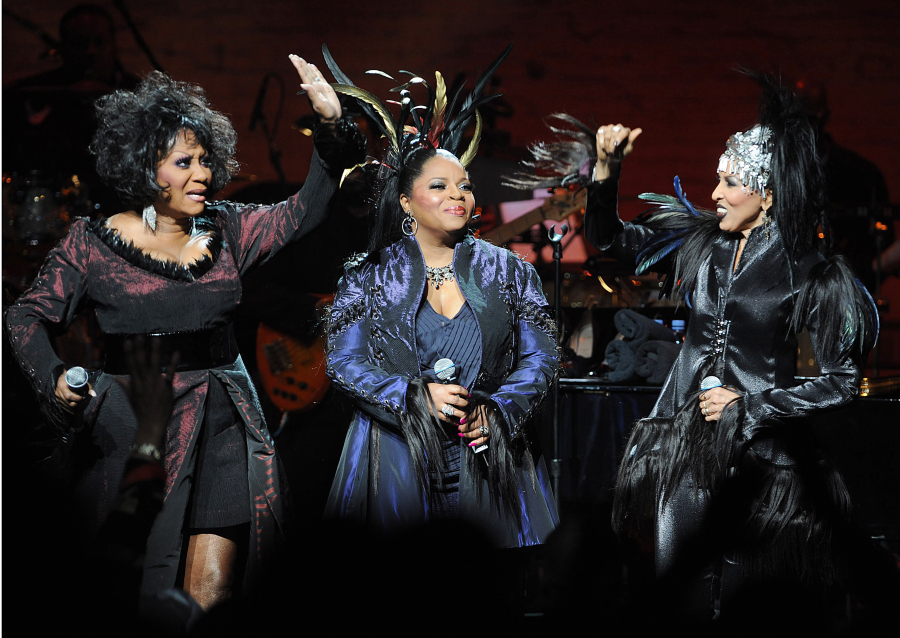An infectious recording about a sex worker in New Orleans is now considered one of the “audio treasures worthy of preservation for all time.”
“Lady Marmalade,” Labelle’s 1974 R&B classic, is among the 25 recordings entered into the National Recording Registry.
On Wednesday, the Allen Toussaint-produced track sung by vocal powerhouses Patti LaBelle, Nona Hendryx and Sarah Dash, joined other modern pop hits by the likes of Kool & the Gang, Janet Jackson, Nas and one of the earliest recordings of an American voice as inductees by the Library of Congress.
“The National Recording Registry will preserve our history through these vibrant recordings of music and voices that have reflected our humanity and shaped our culture from the past 143 years,” Librarian of Congress Carla Hayden said. “We received about 900 public nominations this year for recordings to add to the registry, and we welcome the public’s input as the Library of Congress and its partners preserve the diverse sounds of history and culture.”
Created in 2000, the registry has designated recordings at least 10 years old as being “culturally, historically or aesthetically significant.” So far, the registry includes 575 recordings.
Louis Armstrong’s 1938 rendition of “When the Saints Go Marching In,” Janet Jackson’s “Rhythm Nation 1814,” Kermit the Frog’s “The Rainbow Connection,” Marlo Thomas & Friends’ “Free to Be… You and Me” and Nas’ 1994 debut album “Illmatic” are also among the 25 recordings added to the Library of Congress’ National Recording Registry.
Famed for its “Hey sista, go sista” intro and its popular refrain “Voulez-vous coucher avec moi (ce soir)?” which translates to “Do you want to sleep with me (tonight)?” “Lady Marmalade” – written by Bob Crewe and Kenny Nolan and co-produced with Labelle’s manager Vicki Wickham – is the Philadelphia-formed trio’s greatest hit.
“I mean, it’s become an anthem, sort of like ‘I Will Survive,'” Hendryx told Liz Smith in 2014, comparing the song to Gloria Gaynor’s legendary disco anthem. “Of course, I think ‘Lady Marmalade’ is much more fun because it’s about, you know, a hooker!”
“I didn’t know we were singing about a lady of the evening,” LaBelle recalled in a 2015 interview with The Guardian. “Young girls today are so well versed because of the internet, so they’d never not realize, but it was different then. Thank God we did the song, anyway!”
Ranked as No. 16 on Billboard’s list of 100 Greatest Girl Group Songs of All Time, the song was No. 1 hit on the Billboard Hot 100 chart in 1975.
Over the decades, many artists covered the naughty song, which contain English and French lyrics, but the most notable is the Rockwilder and Missy “Misdemeanor” Elliott-produced 2001 version by singers Christina Aguilera, Mya, Pink and rapper Lil’ Kim, recorded for the “Moulin Rouge!” soundtrack. That rendition became a No. 1 hit internationally and scored a Grammy Award for “Best Pop Collaboration with Vocals” in 2002.
The oldest recording on the 2020 registry is by great inventor Thomas Edison, made in St. Louis in July 1878, a few months after he invented his tape recording machine. Recorded on a piece of tinfoil, with a run time of 78 seconds, it is believed to be the oldest playable recording of an American voice, and the earliest surviving document capturing a musical performance. It went unheard until 2013, when scientists announced they had developed a way to recover the sound from the foil.
A 1945 radio episode of the soap opera “The Guiding Light,” considered the longest-running scripted program in broadcast history (on radio and then television from 1937 to 2009), also made the registry, which featured other nonmusical recordings such as Phil Rizzuto’s play-by-play of Roger Maris’ 61st home run on Oct. 1, 1961, and the 2008 episode “The Giant Pool of Money” of the radio show “This American Life” about the subprime mortgage crisis.



